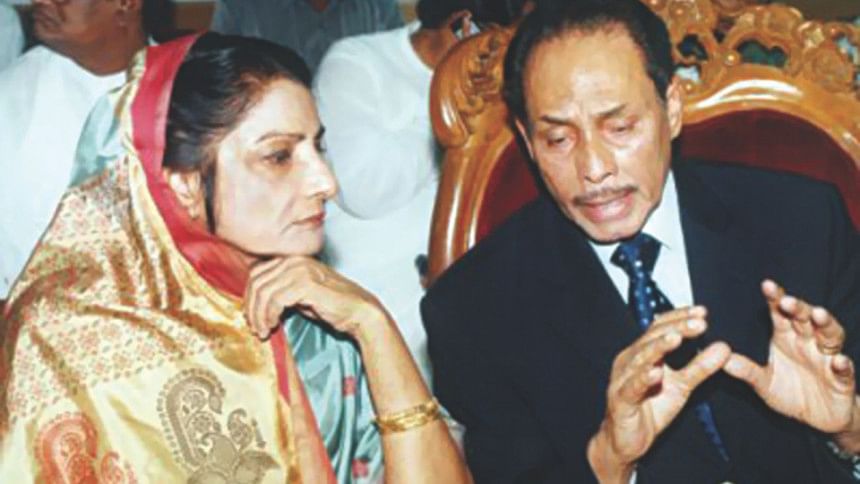The Other Woman

BORN in the womb of a military dictatorship and in the hands of a notoriously unpredictable leader, Jatya Party (JP) has indeed come a long way. Before the mass upsurge of 1990 that had witnessed the ouster of the JP from power, the party's strength had indeed never been tested. The two elections that it had won with an overwhelming margin were when it was in power.
Having said that, the party shocked its critics in the February 27, 1991 election, in which it had bagged 35 seats, winning as many as 11.9 percent votes. With its leader Lt Gen (rtd) Hussain Mohammad Ershad in prison and the big guns of the party either in hiding or in jail, most of the JP candidates could not even do proper electioneering. The election had witnessed a surge in votes of the rightists and centre rightist political parties, and it will not be difficult to tell how many seats the Bangladesh Nationalist Party (BNP; 140) and Jamaat-e-Islami (JI; 18) would have got if the JP's charismatic leader had been given unfettered access to the ordinary voters.
Twenty four years on, the JP's votes have remained the same. At least that is what the stats tell us. In the last year's one-sided election, the party had got 34 seats (11.31%). This is surprising for some of the JP candidates had won their parliament berths uncontested, and with the main opposition BNP boycotting the election after calling it farcical, Ershad's side was supposed to put up a good show.
Instead of seeing the absence of BNP in the election as an opportunity, the JP handled the polls the way one would deal with a necessary encumbrance. What now seems a strange strategy, the party leadership quite deliberately split itself in the line of anti-election (Ershad) and pro-election (Rowshan Ershad) camps. Ershad threatened to commit suicide if he was forced into joining the polls and declared the said intention with a gun in hand and all, and his wife called her faction the real party with some JP faithful suddenly clamouring around her.
The biggest opportunity that the JP has missed perhaps came before last year's national election. The party could have gone to the voters with a pro-people agenda, insisting on a fight in all the 300 seats as a prerequisite for its participation in the polls and it might have tried to come before the electorate as an alternate to the Khaleda-led alliance. But the JP had failed to do that and it failed miserably even to become an opposition in the parliament.
Hedging its bet in such a manner saved Ershad from serving some prison term in a graft case or something even more life threatening--a total revival of Gen Abul Manzoor murder case. The Awami League had done to the JP what all the ruling parties had done to Ershad since he has been overthrown from power --the powers that be coax the deposed dictator into toeing the line, and when he refused to buckle, the proverbial stick is brought and the General would listen.
In a nutshell, that has been the sole political strategy of the JP--to save Ershad from further humiliation, in the party lingo it roughly means a prison sentence. The policy has so far been completely successful in attaining its goal, as the party Chairperson hasn't had to go to prison for 14 years. But it has destroyed the JP as a political entity. It claims itself to be the main opposition, but some of its MPs are holding portfolios in the Sheikh Hasina-led Awami League government, and apparently they have refused to step down even after Ershad has told them to do so. To make matters even more grievous, Ershad himself has been made the Prime Minister's Special Envoy. Not only that, there are instances when Prime Minister and Awami League supremo had to intervene to resolve disputes between JP MPs. There have been newspaper reports according to which the party Secretary General and once firebrand student leader Ziauddin Bablu publicly supported the AL mayoral candidate AJM Nasir Uddin in Chittagong. It would not have caused much of a stir if the JP did not have a mayor nominee in the country's commercial capital.
Farce after farce fate, it seems, has piled upon the JP; and more might be in the offing. The AL has made some inroads into the party heartland in Rangpur. The JI, too, has some popular candidates in the division. In the local government body election that took place last year, the JP candidates got a heavy beating and the 'main opposition' was reduced to a non-entity. Party discipline is also in tatters, so is its diminishing visibility as an opposition party. If properly strategised, the JP could have given the BNP a run for its money, but now the party itself looks like a wrong bet.
Bangladesh has two main opposition parties now, and both of them are led by women--one in the House and the other on the street. Rowshan Ershad, the leader of the opposition in the parliament, is soft-spoken and is often praised by the PM herself. She is far from the kind of leaders we have seen gracing the seat that she sits in. Then again the JP is no revolutionary party either, over the years it has been reduced to a henpecked opposition, crushed to the rubbles is its potential to become a real centrist political party.
The writer is a writer, editor and journalist. He can be contacted at: [email protected]
Twitter: @ahmedehussain

 For all latest news, follow The Daily Star's Google News channel.
For all latest news, follow The Daily Star's Google News channel. 



Comments